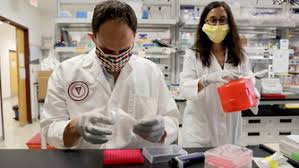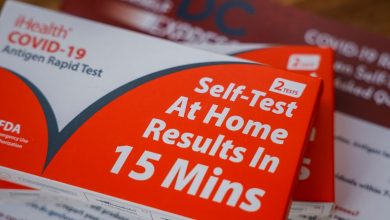Covid-19
Virginia Tech Researchers Establish Reverse Genetics System to Facilitate COVID-19 Research

The novel coronavirus, or SARS-CoV-2, is currently causing a worldwide pandemic that has infected more than 5 million human beings, and the number continues to climb. Vaccines and antivirals are urgently needed to combat this threat, and the viral genetics that resulted in this outbreak must be identified.
With funding from the Fralin Life Sciences Institute at Virginia Tech, researchers James Weger-Lucarelli and Nisha Duggal, from the Virginia-Maryland College of Veterinary Medicine, are establishing a reverse genetics system for SARS-CoV-2 that will serve as the basis for vaccine design and for studying viral mutations associated with COVID-19 severity and viral transmission.
“The reverse genetics system is the basis for all future studies, including vaccine studies. It will allow us to manipulate the SARS-CoV-2 viral genome so that we can discover weaknesses in the virus to exploit,” said Weger-Lucarelli, a research assistant professor in the Department of Biomedical Sciences and Pathobiology in the Virginia-Maryland College of Veterinary Medicine.
Having studied Zika and mosquito-borne viruses in the past using reverse genetics systems, Weger-Lucarelli and Duggal, who are both affiliated faculty of the Fralin Life Sciences Institute, will create a new reverse genetics system for SARS-CoV-2 that will provide a blueprint for making vaccines and reporter viruses.
SARS-CoV-2 stores its genetic material in ribonucleic acid (RNA), as opposed to deoxyribonucleic acid (DNA), making it difficult for scientists to study and manipulate the viral genome. With a reverse genetics system, scientists can convert the virus’s RNA back into DNA through a process called reverse transcription.
With funding from the Fralin Life Sciences Institute at Virginia Tech, researchers James Weger-Lucarelli and Nisha Duggal, from the Virginia-Maryland College of Veterinary Medicine, are establishing a reverse genetics system for SARS-CoV-2 that will serve as the basis for vaccine design and for studying viral mutations associated with COVID-19 severity and viral transmission.
“The reverse genetics system is the basis for all future studies, including vaccine studies. It will allow us to manipulate the SARS-CoV-2 viral genome so that we can discover weaknesses in the virus to exploit,” said Weger-Lucarelli, a research assistant professor in the Department of Biomedical Sciences and Pathobiology in the Virginia-Maryland College of Veterinary Medicine.
Having studied Zika and mosquito-borne viruses in the past using reverse genetics systems, Weger-Lucarelli and Duggal, who are both affiliated faculty of the Fralin Life Sciences Institute, will create a new reverse genetics system for SARS-CoV-2 that will provide a blueprint for making vaccines and reporter viruses.
SARS-CoV-2 stores its genetic material in ribonucleic acid (RNA), as opposed to deoxyribonucleic acid (DNA), making it difficult for scientists to study and manipulate the viral genome. With a reverse genetics system, scientists can convert the virus’s RNA back into DNA through a process called reverse transcription.
“With Zika virus, we were able to use a lot of the existing animal models that we already had, and we could use the templates from previous reverse genetics systems. This time, we are working with a novel respiratory pathogen; thus, there is a lack of available animal models, and we’re building a new reverse genetics system,” said Duggal, an assistant professor of molecular and cellular biology in the Department of Biomedical Sciences and Pathobiology.
Recent studies have shown that SARS-CoV-2 does not infect wild-type mice; the researchers will eventually study transgenic mice that are susceptible to the virus, but they are not readily available at this time. In the meantime, Weger-Lucarelli and Duggal will modify the virus to a mouse-adapted strain so that they can conduct research effectively. This model will recapitulate human disease for in vivo studies of vaccine efficacy and antiviral therapeutics.
However, Weger-Lucarelli and Duggal’s research won’t stop there. With the novelty of SARS-CoV-2, there are many factors that can contribute to the severity of COVID-19 disease that have yet to be explored in depth, such as obesity and the possibility of fetal transmission.
The Weger-Lucarelli lab is tasked with producing molecular tools to study SARS-CoV-2 and for testing antivirals. The lab is also working with Irving Coy Allen, an associate professor of inflammatory disease in the Department of Biomedical Sciences and Pathobiology, as they investigate the role of obesity and diabetes in COVID-19 severity.
According to estimates, around 43 percent of the United States population is obese, around 10 percent are diabetic, and 35 percent are pre-diabetic. Individuals with these conditions might be more prone to contracting severe diseases, such as COVID-19, because they have an irregular immune response.
“Obesity and diabetes limit a proper immune response to the virus,” said Weger-Lucarelli. “We are trying to figure out how and why the immune system is limited by these conditions so that we can produce therapeutics to prevent the severe disease that these individuals experience.”
Weger-Lucarelli’s $300,000 NSF proposal to study obesity, coronavirus disease, and transmission was just recommended for funding.
In addition to developing the mouse-adapted strain of SARS-CoV-2, the Duggal lab will study how COVID-19 infections differ in males and females and whether newborns of COVID-19 positive mothers may have an acquired immunity to infection through antibodies that are passed to the fetus in utero.
“With our Zika research, we have been looking at the transmission of the virus to fetuses. Based on the few reports that have been published so far for SARS-Cov-2, it looks like transmission of the virus to the fetus is unlikely to be happening. We want to find out how exposure can possibly protect the neonates from subsequent infections,” said Duggal.
Ultimately, Weger-Lucarelli and Duggal hope to share their genetic tools with researchers at Virginia Tech and at other universities around the country. They plan to submit a joint proposal on their reverse genetics system to the National Institutes of Health.
“I think we were lucky to get this COVID-19 seed funding. We are going to use it to help generate tools that everyone can use, which will be really helpful for anyone who wants to study any aspect of the virus or disease,” said Duggal.
In immediate response to the COVID-19 pandemic, Virginia Tech faculty, staff, and students have initiated numerous research projects with local and global salience. Learn more from the Office of the Vice President for Research and Innovation.
Recent studies have shown that SARS-CoV-2 does not infect wild-type mice; the researchers will eventually study transgenic mice that are susceptible to the virus, but they are not readily available at this time. In the meantime, Weger-Lucarelli and Duggal will modify the virus to a mouse-adapted strain so that they can conduct research effectively. This model will recapitulate human disease for in vivo studies of vaccine efficacy and antiviral therapeutics.
However, Weger-Lucarelli and Duggal’s research won’t stop there. With the novelty of SARS-CoV-2, there are many factors that can contribute to the severity of COVID-19 disease that have yet to be explored in depth, such as obesity and the possibility of fetal transmission.
The Weger-Lucarelli lab is tasked with producing molecular tools to study SARS-CoV-2 and for testing antivirals. The lab is also working with Irving Coy Allen, an associate professor of inflammatory disease in the Department of Biomedical Sciences and Pathobiology, as they investigate the role of obesity and diabetes in COVID-19 severity.
According to estimates, around 43 percent of the United States population is obese, around 10 percent are diabetic, and 35 percent are pre-diabetic. Individuals with these conditions might be more prone to contracting severe diseases, such as COVID-19, because they have an irregular immune response.
“Obesity and diabetes limit a proper immune response to the virus,” said Weger-Lucarelli. “We are trying to figure out how and why the immune system is limited by these conditions so that we can produce therapeutics to prevent the severe disease that these individuals experience.”
Weger-Lucarelli’s $300,000 NSF proposal to study obesity, coronavirus disease, and transmission was just recommended for funding.
In addition to developing the mouse-adapted strain of SARS-CoV-2, the Duggal lab will study how COVID-19 infections differ in males and females and whether newborns of COVID-19 positive mothers may have an acquired immunity to infection through antibodies that are passed to the fetus in utero.
“With our Zika research, we have been looking at the transmission of the virus to fetuses. Based on the few reports that have been published so far for SARS-Cov-2, it looks like transmission of the virus to the fetus is unlikely to be happening. We want to find out how exposure can possibly protect the neonates from subsequent infections,” said Duggal.
Ultimately, Weger-Lucarelli and Duggal hope to share their genetic tools with researchers at Virginia Tech and at other universities around the country. They plan to submit a joint proposal on their reverse genetics system to the National Institutes of Health.
“I think we were lucky to get this COVID-19 seed funding. We are going to use it to help generate tools that everyone can use, which will be really helpful for anyone who wants to study any aspect of the virus or disease,” said Duggal.
In immediate response to the COVID-19 pandemic, Virginia Tech faculty, staff, and students have initiated numerous research projects with local and global salience. Learn more from the Office of the Vice President for Research and Innovation.




